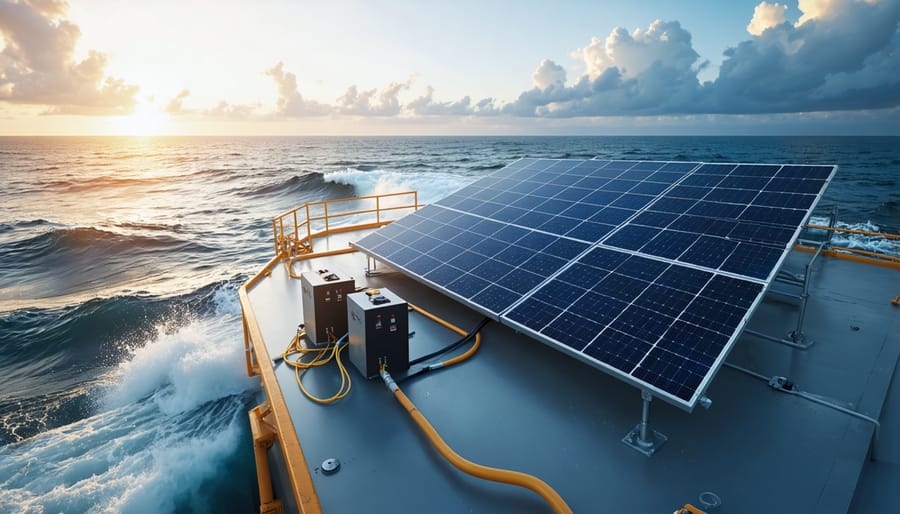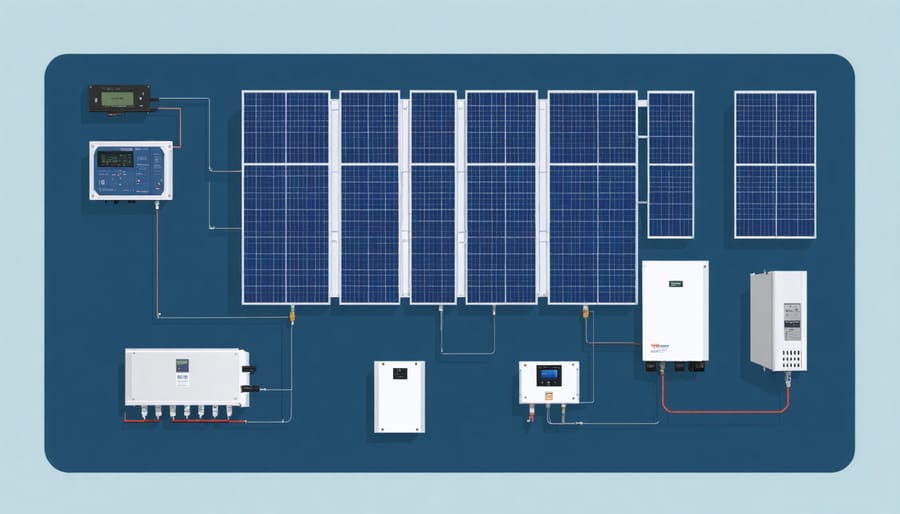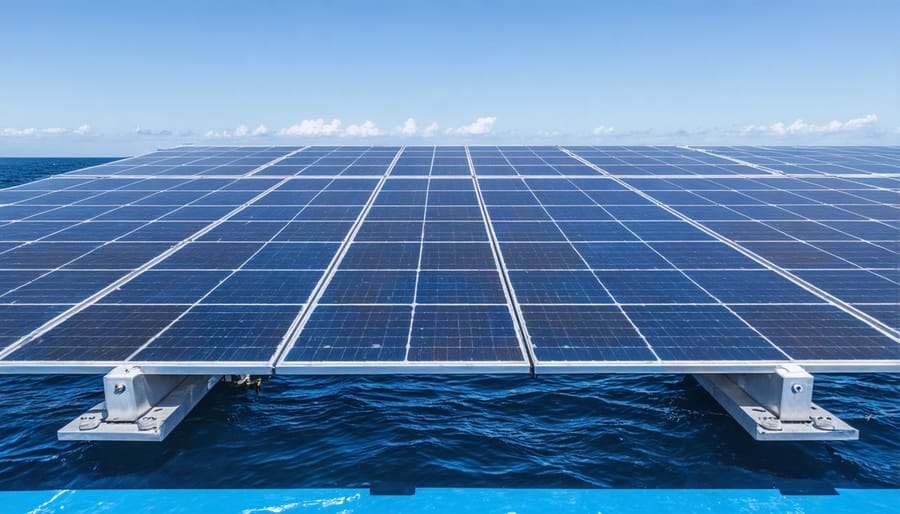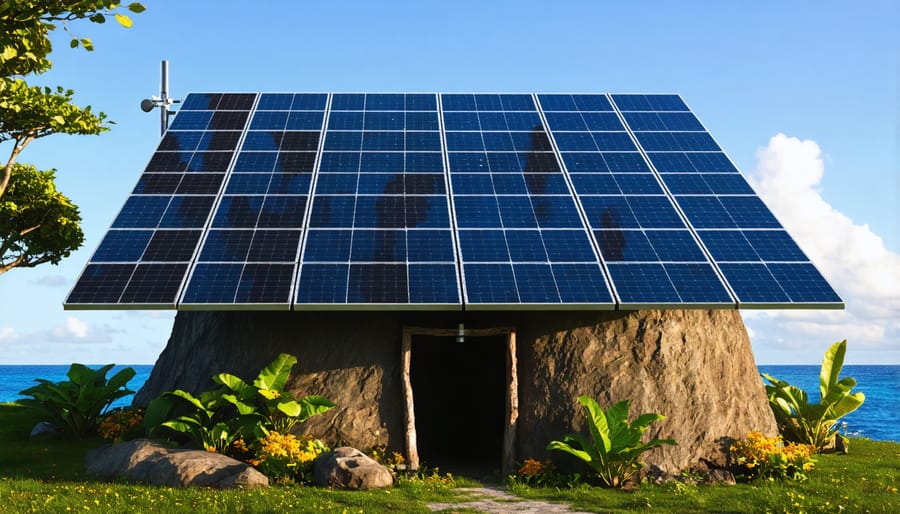Power Your Offshore Project: 7kW Solar System That Works Miles From Shore

A 7kW off-grid solar system represents a robust power solution capable of delivering complete energy independence for homes, remote facilities, and offshore solar power solutions. This comprehensive system typically combines 20-24 high-efficiency solar panels, advanced battery storage of 15-20kWh, and sophisticated power management electronics to ensure reliable performance in demanding environments.
For European homeowners and businesses, a 7kW system provides sufficient capacity to power essential appliances, heating systems, and industrial equipment while maintaining critical operations during grid outages. With proper sizing and implementation, this configuration delivers approximately 28-32kWh of daily energy production under optimal conditions, making it particularly suitable for households consuming 25-30kWh per day or small commercial operations requiring consistent power supply.
Modern 7kW installations feature enhanced monitoring capabilities, smart load management, and robust backup systems, ensuring seamless operation across diverse environmental conditions. This scalable solution addresses growing energy independence demands while supporting Europe’s transition toward sustainable power generation.
Understanding 7kW Offshore Solar Systems
Core Components for Marine Environments
For reliable performance in marine environments, specialized components are essential to withstand harsh conditions while maintaining optimal energy generation. Marine-grade solar panels feature enhanced lamination and specialized glass coatings that resist salt spray and maintain efficiency even in high-humidity conditions. These panels typically incorporate monocrystalline technology with advanced anti-corrosion frames, ensuring longevity in offshore applications.
The mounting infrastructure plays a crucial role in marine renewable energy integration. High-grade stainless steel or aluminum mounting systems with specialized protective coatings prevent galvanic corrosion and ensure structural integrity against strong winds and wave action. Double-sealed junction boxes and marine-grade cables with enhanced UV protection are standard features.
Marine-specific inverters come equipped with conformal coating on circuit boards and reinforced housing to protect against salt air and moisture. These inverters often include advanced monitoring systems that can detect potential issues before they escalate, ensuring continuous operation in challenging offshore conditions. Integrated surge protection and isolation transformers provide additional safeguards against electrical anomalies common in marine environments.

Battery Storage Solutions
For a 7kW off-grid solar system, selecting the right battery storage solution is crucial for reliable power supply. Deep-cycle lithium-ion batteries are increasingly becoming the preferred choice for marine applications, offering superior energy density and longer lifespans compared to traditional lead-acid alternatives. A typical 7kW system requires approximately 20-30kWh of usable battery capacity to ensure reliable power during periods without sunlight.
Marine-grade batteries must meet specific standards for safety and durability in saltwater environments. Look for batteries with IP67 or higher waterproof ratings and corrosion-resistant casings. Modern lithium iron phosphate (LiFePO4) batteries offer excellent stability and safety features, making them ideal for marine installations.
Storage requirements should account for factors like temperature regulation and ventilation. Batteries should be housed in dedicated compartments with proper insulation and climate control systems. Consider installing battery monitoring systems to track performance and maintain optimal charging cycles. For European installations, ensure all components comply with CE certification standards and maritime regulations.
Regular maintenance and proper sizing of the battery bank are essential for system longevity. Most modern marine battery systems can achieve 10-15 years of service life with proper care and operation.
Installation Considerations for Offshore Applications
Structural Requirements
When installing a 7kW off-grid solar system in marine environments, robust structural support is paramount for long-term reliability and safety. The mounting framework must withstand significant wind loads, salt spray exposure, and potential wave impact, necessitating the use of marine-grade stainless steel or aluminium components.
The primary mounting structure typically requires reinforced support beams rated for at least 50 kg/m² to accommodate both the solar panels and additional environmental forces. Anti-corrosion treatments and protective coatings are essential for all metal components, with regular inspection points built into the design for maintenance access.
For floating installations, the structural framework must incorporate specialised flotation devices and flexible mounting systems that can adapt to wave motion while maintaining panel orientation. These systems typically employ UV-resistant HDPE floats with reinforced connection points and marine-grade mounting clamps.
Anchoring systems need careful consideration, with multiple attachment points distributed across the structure to ensure stability. The foundation should be designed to resist both uplift forces and lateral movements, often requiring professional engineering calculations specific to the installation location.
Cable management systems must be integrated into the structural design, featuring waterproof conduits and strain relief mechanisms to protect electrical connections from environmental stress. All mounting hardware should meet IP67 rating standards minimum, ensuring complete protection against water ingress and corrosion.

Weather Protection Systems
In marine and coastal environments, protecting your 7kW off-grid solar system from harsh elements is crucial for long-term performance. Modern advanced solar technology incorporates specialized protective measures designed specifically for challenging conditions.
Key protective elements include marine-grade stainless steel mounting systems and enhanced panel encapsulation to prevent salt spray corrosion. Double-glass solar modules with reinforced edge sealing provide superior protection against moisture intrusion and salt air degradation. Implementation of IP67-rated junction boxes and connectors ensures complete waterproof protection for electrical components.
For extreme weather resilience, systems typically feature strengthened mounting frames capable of withstanding wind speeds up to 150 km/h. Anti-corrosion coatings and specialized paint treatments on all metal components create an additional barrier against salt spray and atmospheric pollutants.
Temperature regulation systems, including smart ventilation design and thermal management solutions, prevent overheating in intense sunshine while maintaining optimal performance. Intelligent monitoring systems alert owners to any environmental stress on components, allowing for preventive maintenance before damage occurs.
Regular maintenance protocols, including quarterly cleaning with specialized marine-environment cleaning solutions and annual integrity checks of all protective elements, ensure your system maintains peak efficiency despite challenging coastal conditions.
Maintenance and Performance Optimization
Regular Maintenance Protocols
Regular maintenance is crucial for ensuring the optimal performance and longevity of your 7kW off-grid solar system. We recommend conducting monthly visual inspections of all system components, including solar panels, batteries, inverters, and wiring connections. Clean the solar panels every three months or more frequently in dusty environments using soft brushes and appropriate cleaning solutions to maintain maximum energy generation efficiency.
Battery maintenance is particularly critical; check electrolyte levels in lead-acid batteries monthly and ensure proper ventilation in the battery storage area. Monitor battery voltage readings weekly and maintain detailed logs of performance metrics. Inspect and tighten all electrical connections every six months to prevent power losses and potential system failures.
The charge controller and inverter require quarterly inspection for proper functioning and cooling system effectiveness. Update system firmware when available and test backup systems regularly. During winter months, clear any snow accumulation from panels and check that weather sealing remains intact.
Professional maintenance service is recommended annually for comprehensive system evaluation, including thermal imaging of connections, battery capacity testing, and calibration of monitoring equipment. Keep detailed maintenance records and respond promptly to any performance alerts from your monitoring system.
Performance Monitoring Systems
Modern 7kW off-grid solar systems benefit significantly from advanced performance monitoring solutions that ensure optimal operation and rapid issue detection. Remote monitoring platforms enable system owners to track real-time energy production, battery status, and consumption patterns through user-friendly mobile apps or web interfaces.
These monitoring systems typically feature comprehensive data logging capabilities, recording key metrics such as solar panel efficiency, battery charge levels, and power flow distribution. Smart alerts notify users about potential issues, maintenance requirements, or unusual consumption patterns, allowing for proactive system management.
Advanced monitoring solutions often incorporate weather forecasting integration, helping users anticipate energy production levels and adjust consumption accordingly. This feature is particularly valuable for European installations, where seasonal variations significantly impact solar generation.
Many systems now offer detailed performance analytics, providing insights into system efficiency and suggesting optimization opportunities. Users can access historical data to identify trends, compare performance across different periods, and make informed decisions about energy usage.
For enhanced reliability, these monitoring systems often include backup communication methods, ensuring continuous system oversight even in areas with limited connectivity. This comprehensive monitoring approach helps maintain system efficiency and extends the lifespan of all components through preventive maintenance.
Real-World Applications and Case Studies
Maritime Industry Applications
The maritime industry has embraced 7kW off-grid solar systems as a reliable power solution for various applications at sea. These systems have proven particularly valuable on medium-sized vessels, research stations, and offshore platforms where traditional power sources are impractical or cost-prohibitive. As part of Europe’s growing offshore renewable innovations, these installations demonstrate remarkable versatility and durability.
Notable success stories include the North Sea research platform Alpha-7, which implemented a 7kW solar system to power its communication equipment and environmental monitoring stations. The installation reduced diesel consumption by 65% while maintaining consistent power supply throughout variable weather conditions. Similarly, the Mediterranean fishing fleet has integrated these systems to power refrigeration units and navigation equipment, achieving significant fuel savings and enhanced operational reliability.
The systems’ robust design, featuring marine-grade components and specialized mounting solutions, ensures longevity in harsh saltwater environments. Advanced battery storage systems, typically utilizing lithium-ion technology, provide reliable power during extended periods of limited sunlight. Regular maintenance schedules have shown these installations maintaining 90% efficiency even after five years of continuous operation, making them a cost-effective solution for maritime applications.
These successful implementations have paved the way for wider adoption across European maritime operations, demonstrating the practical benefits of sustainable energy solutions in challenging marine environments.

Remote Island Installations
Remote island installations have proven the remarkable versatility and reliability of 7kW off-grid solar systems in challenging environments. The Greek Cyclades Islands showcase several successful implementations, where these systems power both residential properties and small businesses with remarkable efficiency.
On Milos Island, a family-run taverna successfully transitioned to solar power, implementing a 7kW system that manages their refrigeration, lighting, and cooking equipment. The installation includes enhanced battery storage to accommodate evening operations and tourist season peak demands, demonstrating excellent reliability with 99% uptime throughout the year.
The Croatian archipelago presents another compelling example, where a cluster of holiday cottages utilizes interconnected 7kW systems. This innovative approach creates a micro-grid system that enables power sharing between properties during varying occupancy levels, maximising energy efficiency and reducing overall storage requirements.
These installations have significantly reduced dependency on diesel generators, cutting operational costs by approximately 70% and eliminating the logistical challenges of fuel transportation to remote locations. The systems have proven particularly resilient during extreme weather conditions, with specially reinforced mounting systems designed to withstand Mediterranean wind patterns.
The success of these installations has inspired similar projects across European coastal regions, establishing a blueprint for sustainable energy solutions in remote maritime environments. Regular maintenance requirements have been minimal, with annual inspections sufficient for optimal performance.
A 7kW off-grid solar system represents a significant step towards energy independence and sustainability for marine applications. These systems offer reliable power generation while reducing operational costs and environmental impact. The key benefits include consistent power supply in remote locations, reduced dependency on traditional fuel sources, and minimal maintenance requirements once properly installed.
When planning an offshore 7kW solar installation, consider factors such as marine-grade components, adequate battery storage capacity, and robust mounting solutions to withstand harsh ocean conditions. The initial investment, while substantial, typically delivers returns through reduced fuel costs and increased operational reliability.
Success in implementing these systems depends on thorough planning, professional installation, and regular maintenance schedules. European regulations and standards ensure safety and performance, while innovative technologies continue to improve system efficiency and durability.
For optimal results, work with experienced installers who understand marine environments and can provide comprehensive support throughout the system’s lifecycle. With proper design and implementation, a 7kW off-grid solar system can provide years of reliable, sustainable power for your offshore applications.
Leave a Reply